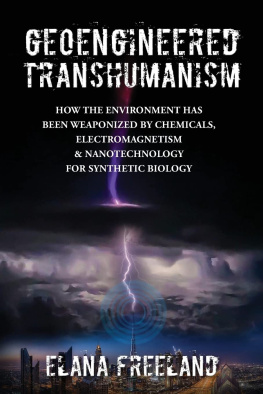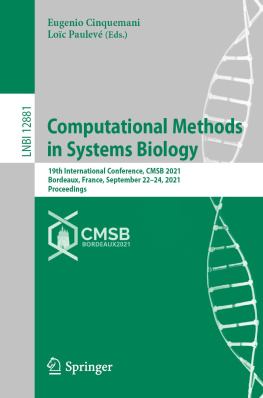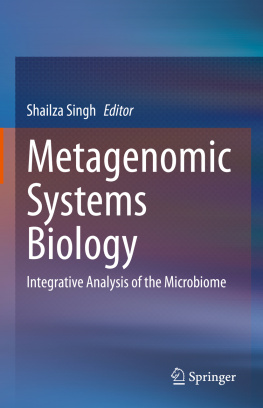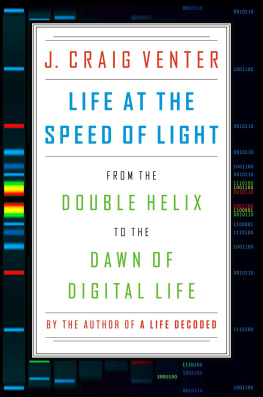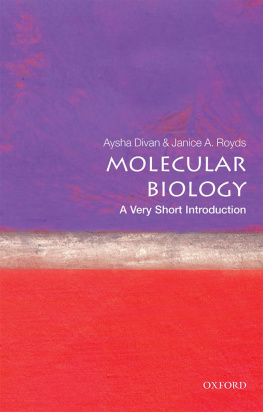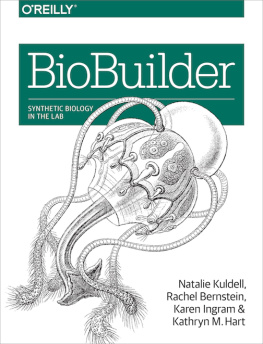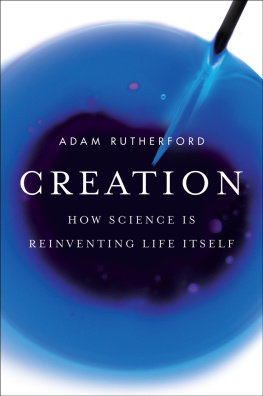+1 YR, THE END OF THE
BEGINNING, TRANSHUMANISM,
AND THE PANSPERMIA ERA

A popular theme in techno-thriller novels is the story of mutant microbes running amok and almost, but not quite, wiping out the human race. The locus classicus for this scenario is Michael Crichtons The Andromeda Strain (1969). Here a deadly microbe of extraterrestrial origin lands near the fictional town of Piedmont, Arizona, and the invading organisms slaughter the towns entire population, with the exception of two residents who mysteriously survive. The microbe responsible, the Andromeda strain of the title, mutates with each cell division and acquires new and even more destructive biological properties. The fate of humanity hangs in the balance, until a government scientist working inside a secret and secure biological containment facility somewhere in Nevada heroically carries out a last-minute save. The Andromeda microbes then depart for the upper atmosphere, whose lower oxygen content better suits their growth. (This story line seems to be a Michael Crichton specialty. His 2002 novel, Prey, depicts a race of artificially alive nanorobots that escape from the lab, collect themselves into swarms, and then hunt down and kill people.)
Paranoia about exotic microbes is not confined to fiction, however. In real life it underlies the hostility toward, and temporary suppression of, the first generation of recombinant DNA experiments during the mid-1970s. Its what motivates panic reactions to genetically modified foods. And its also what incites some knee-jerk criticisms of synthetic biology. Scientists are making strands of DNA that never existed, claims Jim Thomas, a synthetic biology critic with the ETC Group, a technology monitoring organization based in Ottawa. So there is nothing to compare them to.
Well, not exactly. Every two parents who conceive a child are creating strands of DNA that never existed Bacteria are constantly exchanging genes in a process called conjugation, thereby giving rise to yet more strands of DNA that never existed. In fact, the creation of DNA that never before existed is a constant and pervasive feature of life on earth.
Despite the fear evoked by the idea of genetically modified organisms, those of the natural variety are hard to beat when it comes to posing serious threats to humanity. Yersinia pestis, the causative agent of bubonic plague, is estimated to have killed as many as a third to a half of all Europeans in the Black Death epidemic of the mid-fourteenth century. The bacterium made a comeback appearance in the Great Plague, another wave of annihilation that swept through the Continent in 1665-1666. The smallpox viruses, Variola major and minor, are thought to have caused more deaths than any other disease in human history, wiping out as many as 300 to 500 million people in the twentieth century alone. (The disease was eradicated in 1979.) Tuberculosis, malaria, cholera, AIDSall are products of microbial agents of mass destruction that are natural in origin.
So its not as if we have to look to genetically altered microbes to find models of successful microbial killing machines. Still, the question has to be faced whether the process of genetic engineering is likely to make existing microbes even more deadly, giving rise to one or more Andromeda strains that originated in biotechnology labs here on earth.
And if genetically modified microbes pose a threat, what about genetically enhanced human beings, so-called transhumans? Its a clich that the human being is the most dangerous animal. Would a race of trans-humans be even worse?

The term transhuman harnesses the prefix trans, as in across or beyond, or acts as an abbreviation for transitional human. The transhuman occupies an intermediate stage between a normal biological human and one of the posthuman variety, a being whose capacities so far outstrip those of ordinary, everyday mortals as to constitute a new and separate species. The nomenclature is a bit imprecise, however, owing to the fact that the concept of improving human qualities to the point where they make up a species difference is a blend of ideas from science fiction, science, folklore and legend, and sheer crackpottery.
Nonetheless, transhumanism (sometimes symbolized as H+) has been taken seriously enough by some as to warrant attention and criticism. In 2004, for example, the magazine Foreign Policy published a special report, The Worlds Most Dangerous Ideas In it, Francis Fukuyama, a professor of international political economy at the Johns Hopkins School of Advanced International Studies, proposed the idea of transhumanism as one of the most dangerous and revolting products of those he referred to as genetic bulldozers (such bulldozers apparently being people who push their transhumanist agenda with lots of force).
This was puzzling inasmuch as the author acknowledged that trans-humanism (which he defined as the attempt to use biotechnology to make ourselves stronger, smarter, less prone to violence, and longer-lived) had a certain inherent logic and appeal. Part of the contemporary biomedical research agenda, he admitted, was focused on procedures and technologies that were designed as much to enhance ourselves psychologically and biologically as to cure illness; medical science presented us with a range of mood-altering drugs, prenatal genetic screening tests, and gene therapies, among other things. Moreover, the author also conceded that the human race, after all, is a pretty sorry mess, with our stubborn diseases, physical limitations, and short lives.
Fukuyama, nevertheless, was an implacable foe of transhumanism, his reason being that the first victim of transhumanism might be equality. By this he meant political equality, or equality before the law, not economic equality or uniformity of outcomes. He imagined that transhumans, with their heightened powers, better health, better looks, smarter minds, and longer life spans, would claim comparably outsize rights for themselves.
But by any standard this was an odd argument. There is already a wide variation in talents among members of the human race, but those with great intelligence, strength, and good health do not claim special rights for themselves on that account. Conversely, those with severe physical and/or mental disabilities are nevertheless accorded full human rights by the legal structures of enlightened democratic governments.
This is not to say that transhumanism presents no dangers whatever or that it entails no unintended or unwelcome consequences. A small number of individuals already exist who possess qualities that could be regarded as transhuman in a limited and qualified sense of the term. Rare double mutants in the myostatin gene (a.k.a. MSTN) have lean muscle and low body fat. Rare mutants in the LRP5 gene have extra-strong bones. Mutants in PCSK9 have 88 percent lower coronary disease. Double mutants in CCR5 are HIV resistant (see ). Double mutants in FUT2 are resistant to stomach flu (e.g., noroviruses).
On the other hand, consider those blessed, or cursed, by the condition known as hyperthymesia, the ability to recall autobiographical events in extraordinary detail. First reported in the scientific literature in the journal Neurocase as A Case of Unusual Autobiographical Remembering (2006), the subject was a woman whose remembering dominates her life. Her memory is nonstop, uncontrollable, and automatic. [She] spends an excessive amount of time recalling her personal past with considerable accuracy and reliability. If given a date, she can tell you what she was doing and what day of the week it fell on.


